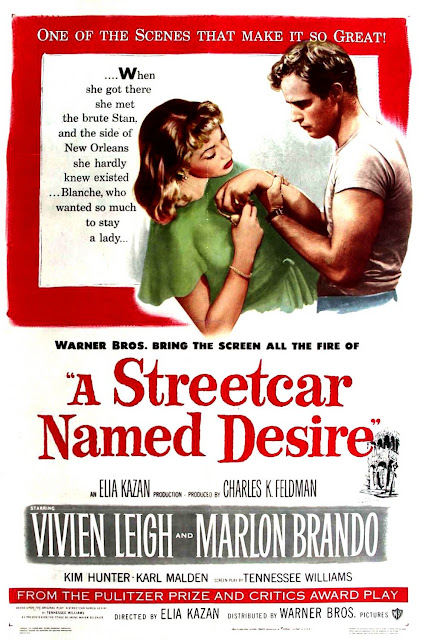A Streetcar Named Desire (1951) ****
Nearly seventy years on, Elia Kazan's 1951 film of Tennessee Williams' (who also wrote the screenplay) 1947 play A Streetcar Named Desire remains a powerful portrait of gender roles, toxic masculinity, mental health, and domestic violence.
Though some of the cinematic techniques used are a bit dated, Streetcar is a beautifully dark chiaroscuro affair to rival any film noir. Given Blanche's (an electric Vivien Leigh) elevated fantasy world lived within her head, her melodramatic performance and the way the camera captures her only make sense. Both she and Kim Hunter ("Stella!") are attractive females but there is no mistaking that Brando is the film's sex symbol, smoldering on screen and driving both women wild with his perfect physique.
In this—only his second film—reprising (along with Hunter and the always great Karl Malden) his Broadway role, Brando became a superstar with his intense method acting. Stanley Kowalski is a complicated character—on one hand reproachable for his treatment of women and his snap temper, an imposing figure with zero tolerance for bullshit; on the other a sensitive man-child, who can charm his way around his shortcomings (thanks in no small part to his physical attributes). Stanley is an astute observer (despite his "base nature" according to Blanche) who does expose certain truths, but at the expense of all concerned.
With its simmering sexuality (originally censored by the Production Code) and the heat of New Orleans as its backdrop, plus the dynamic performances, Williams' potent words, Kazan's bold direction and Alex North's moody score, Streetcar still ranks as one of cinema's best dramas.
You can find my Elia Kazan Feature Films Ranked list here.
You can find my Tennessee Williams Feature Film Adaptations Ranked list here.
Though some of the cinematic techniques used are a bit dated, Streetcar is a beautifully dark chiaroscuro affair to rival any film noir. Given Blanche's (an electric Vivien Leigh) elevated fantasy world lived within her head, her melodramatic performance and the way the camera captures her only make sense. Both she and Kim Hunter ("Stella!") are attractive females but there is no mistaking that Brando is the film's sex symbol, smoldering on screen and driving both women wild with his perfect physique.
In this—only his second film—reprising (along with Hunter and the always great Karl Malden) his Broadway role, Brando became a superstar with his intense method acting. Stanley Kowalski is a complicated character—on one hand reproachable for his treatment of women and his snap temper, an imposing figure with zero tolerance for bullshit; on the other a sensitive man-child, who can charm his way around his shortcomings (thanks in no small part to his physical attributes). Stanley is an astute observer (despite his "base nature" according to Blanche) who does expose certain truths, but at the expense of all concerned.
With its simmering sexuality (originally censored by the Production Code) and the heat of New Orleans as its backdrop, plus the dynamic performances, Williams' potent words, Kazan's bold direction and Alex North's moody score, Streetcar still ranks as one of cinema's best dramas.
You can find my Elia Kazan Feature Films Ranked list here.
You can find my Tennessee Williams Feature Film Adaptations Ranked list here.


Comments
Post a Comment